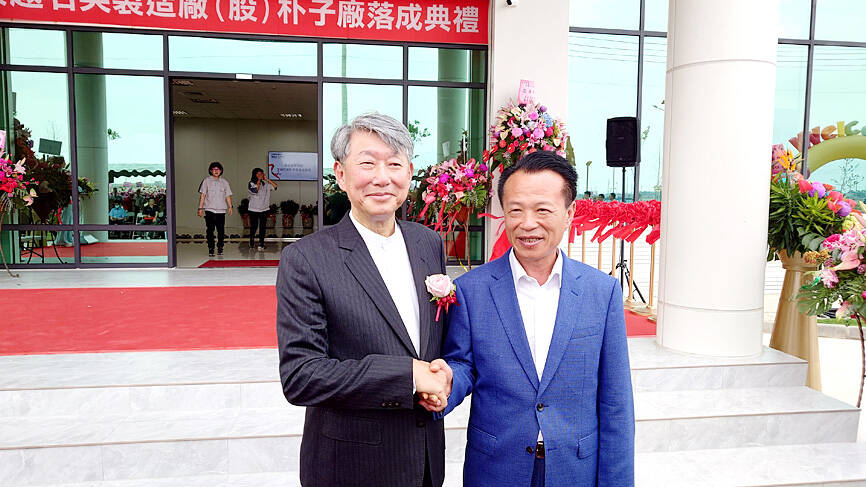J.W. Kuo (郭智輝), minister of economic affairs-designate and chairman of semiconductor raw materials and equipment supplier Topco Group (崇越集團), yesterday said he would prioritize a sufficient supply of electricity to businesses and supply chains that face urgent power needs after taking office on May 20.
Asked whether the government should extend the services of existing nuclear power plants or reactivate suspended power plants, Kuo said he could not make a judgement now, adding that the issue — if it has to be addressed — must be determined by all Taiwanese.
“The goal is to communicate with all users. Only after communicating and making sure everything is safe can we make a decision. Now there is no way to say what we would do,” the Chinese-language Liberty Times (the sister newspaper of the Taipei Times) quoted Kuo as saying on its Web site yesterday.

Photo: CNA
The minister-designate made the remarks on the sidelines of a launch ceremony in Chiayi County’s Puzih City (朴子), where Topco Quartz Products Co (崇越石英) is launching a NT$1.5 billion (US$46.3 million) investment project to support increasing demand from semiconductor companies and to bolster its revenue.
Kuo was named by premier-designate Cho Jung-tai (卓榮泰) on Tuesday as his choice for minister of economic affairs. Since then, Kuo has been visiting various industries, especially those with urgent need for water and electricity, as well as spending time with business owners, supply-chain firms and academics to get first-hand information on power consumption, the Liberty Times reported.
Kuo is to evaluate whether Taiwan is short of electricity and how much electricity is needed to meet the needs of industry, hoping to provide a complete report to the public after taking office next month.
Topco Quartz Products is a joint venture between Topco Group and Japan’s Shin-Etsu Quartz Products Co, which supplies quartz products used in chipmaking and electronic devices.
The Puzih factory is Topco Quartz Products’ third factory in Taiwan in addition to facilities in Hsinchu County’s Hukou Township (湖口) and Chiayi County’s Minsyong Township (民雄), as the company expands production capacity to meet increasing demand.
“The demand for high-purity quartz required for high-end processes has increased significantly in recent years, as semiconductor firms in various countries continue to expand production amid rising interest in artificial intelligence applications and growing geopolitical considerations,” the Liberty Times quoted Topco Group chief executive officer Daniel Wu (吳玉敏) as saying.
The company started the construction of the new factory in the Chiayi Machouhou Industrial Park (嘉義馬稠後產業園區) in 2021.
With an estimated annual production value of NT$2 billion, it would be the largest of its kind in Taiwan and one of the leading quartz suppliers in the world, the Chiayi County Government said in a statement yesterday.
The Puzih plant is expected to supply products to Taiwan Semiconductor Manufacturing Co’s (台積電) 3-nanometer and 5-nanometer fabs in the Southern Taiwan Science Park’s (南部科學園區) Tainan campus and support advanced chip packaging facilities in the science park’s Chiayi campus, while looking to export to overseas markets through Topco Group’s global network, the statement said.

Semiconductor business between Taiwan and the US is a “win-win” model for both sides given the high level of complementarity, the government said yesterday responding to tariff threats from US President Donald Trump. Home to the world’s largest contract chipmaker, Taiwan Semiconductor Manufacturing Co (TSMC, 台積電), Taiwan is a key link in the global technology supply chain for companies such as Apple Inc and Nvidia Corp. Trump said on Monday he plans to impose tariffs on imported chips, pharmaceuticals and steel in an effort to get the producers to make them in the US. “Taiwan and the US semiconductor and other technology industries

SMALL AND EFFICIENT: The Chinese AI app’s initial success has spurred worries in the US that its tech giants’ massive AI spending needs re-evaluation, a market strategist said Chinese artificial intelligence (AI) start-up DeepSeek’s (深度求索) eponymous AI assistant rocketed to the top of Apple Inc’s iPhone download charts, stirring doubts in Silicon Valley about the strength of the US’ technological dominance. The app’s underlying AI model is widely seen as competitive with OpenAI and Meta Platforms Inc’s latest. Its claim that it cost much less to train and develop triggered share moves across Asia’s supply chain. Chinese tech firms linked to DeepSeek, such as Iflytek Co (科大訊飛), surged yesterday, while chipmaking tool makers like Advantest Corp slumped on the potential threat to demand for Nvidia Corp’s AI accelerators. US stock

The US Federal Reserve is expected to announce a pause in rate cuts on Wednesday, as policymakers look to continue tackling inflation under close and vocal scrutiny from US President Donald Trump. The Fed cut its key lending rate by a full percentage point in the final four months of last year and indicated it would move more cautiously going forward amid an uptick in inflation away from its long-term target of 2 percent. “I think they will do nothing, and I think they should do nothing,” Federal Reserve Bank of St Louis former president Jim Bullard said. “I think the

SUBSIDIES: The nominee for commerce secretary indicated the Trump administration wants to put its stamp on the plan, but not unravel it entirely US President Donald Trump’s pick to lead the agency in charge of a US$52 billion semiconductor subsidy program declined to give it unqualified support, raising questions about the disbursement of funds to companies like Intel Corp and Taiwan Semiconductor Manufacturing Co (台積電). “I can’t say that I can honor something I haven’t read,” Howard Lutnick, Trump’s nominee for commerce secretary, said of the binding CHIPS and Science Act awards in a confirmation hearing on Wednesday. “To the extent monies have been disbursed, I would commit to rigorously enforcing documents that have been signed by those companies to make sure we get